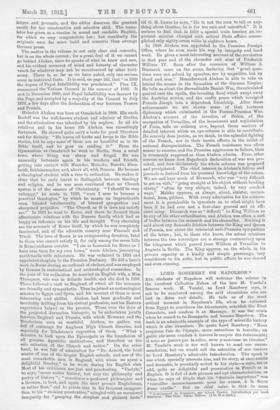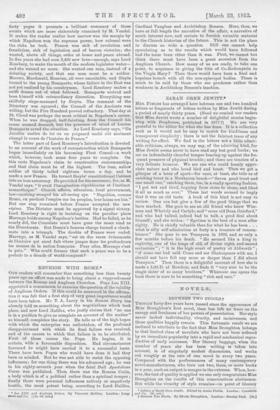LORD ROSEBERY ON NAPOLEON.* ALL students of Napoleon will welcome
the reissue in the excellent Collection Nelson of the late M. Vandal's famous work. M. Vandal, as Lord Rosebery says, is not to be numbered among the arid chroniclers wbo are lost in dates and details. Ho tells us of the most critical moment in Napoleon's life, when he returned from Egypt to overthrow the _Directorate, establish the First Consulate, and confirm it at Marengo. It was the crisis when he ceased to be Bonaparte and became Napoleon. The book is an admirable example of the type of scientific history which is also literature. To quote Lord Rosebery : " Nous respirons Fair do l'epoque, nous entendons le tumulte ; nu guide stir nous conduit It travers le maquis des evenements ; si nous ne jouons pas la scene, nous y assistons en temoins." M. Vandal's work is too well known to need our recom- mendation, but we would call the attention of our readers to Lord Rosebery's admirable Introduction. The epoch is one which specially interests him, and its story, at once subtle and dramatic, is peculiarly suited to his style—a style, let us add, quite as delightful and provocative in French as in English. It is full of deft phrases and apt characterization, as when ho says of Sieyes that his " destine° importune" was travailler inconsciemment pour les autres, It In facon d'une abeille." But its chief value is that in some • L'Arenement de Bonaparte, par Albert YantisF. Introduction pax Lord Rosebery. Two Vols. Paris: Nelson. [1 fr. 25 a each.] forty pages it presents a brilliant summary of those events which are more elaborately examined by M. Vandal. It makes the reader realize how narrow was the margin by which Napoleon won the supreme power, how colossal were the risks he took. France was sick of revolution and fanaticism, sink of legislation and of barren victories; she wanted, above all things, order at home and peace abroad. In five years she had seen 3,400 new laws—enough, says Lord Rosebery, to make the mouth of the modern legislator water— and she wanted no more. She wanted one man, instead of a debating society, and that one man must be a soldier. Moreau, Macdonald, Massone, all were unsuitable, and Sieybs turned to the young Bonaparte, whose failure in the East was not yet realized by his countrymen. Lord Rosebery makes a swift drama out of what followed. Bonaparte arrived and bore himself with extraordinary discretion. Everything was skilfully stage-managed by Sieyes. The remnant of the Directory was squared ; the Council of the Ancients was willing, but the Five Hundred proved refractory. That day at St. Cloud was perhaps the most critical in Napoleon's career. When he was dragged, half-fainting, from the Council his cause seemed doomed, but the presence of 'mind of Lucien Bonaparte saved the situation. As Lord Rosebery says, "Un Jacobin maitre de lui ou un poignard cache eAt aisement change le cours de J'histoire de France."
The latter part of Lord Rosebery's Introduction is devoted to an account of the work of reconstruction which Bonaparte began immediately on his becoming First Consul—a work which, however, took some four years to complete. On this rests Napoleon's claim to constructive statesmanship, and that claim must be of the highest. The lean, sallow soldier of thirty toiled eighteen hours a day, and he made a new France. He turned Sieyes' constitutional Cabinet into an iron autocracy. He provided for his successor; for, as M. Vandal says, "il avail l'imagination republiettine et l'instinot monarthique." Church affairs, education, local government, law—nothing escaped his all-seeing eye. " Napoleon, comma Rome, en perdant l'empire sur lea peuples, leur laissa ses lois." But one step remained before France accepted the new regime. The Dictator must be approved by a signal victory. Lord Rosebery is right in insisting on the peculiar place Marengo holds among Napoleon's battles. Had he failed, as he nearly did, the Consulate must have gone the same road as the Directorate. But Desaix's famous charge turned a check- mate into a triumph. The doubts of France were ended. Marengo, as M. Vandal says, " est un des rares evenements de l'histoire qui aient fait vibrer jusque dans lea profondeurs les masses de la nation francaise. Pour elles, Marengo c'est la paix." Who could foresee that such a peace was to be a prelude to a decade of world-conquest?







































 Previous page
Previous page